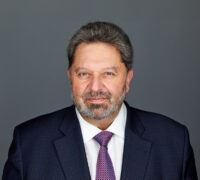In a CEO Dialogue with IMD President Jean-François Manzoni, Ipsen CEO David Loew discusses his leadership style as he orchestrates the French-born pharma firm’s response to its best-selling drug facing generic competition for the first time and shapes a more focused and impactful organization. Here are a few selected highlights of this discussion:
When former Sanofi Pasteur Vaccines head David Loew became CEO of mid-sized biopharma firm Ipsen in 2020, he felt like he was standing on not one, but two burning platforms.
The year before, Ipsen acquired a business developing a medicine for a rare genetic disorder that triggers abnormal bone growth. Post-acquisition, it faced an unexpected regulatory setback, leading Ipsen to withdraw its US application for the drug – a bitter outcome in pharma where medicines are developed at great cost and risk.
The challenge for Loew didn’t end there. The global French-based firm was also staring into the abyss of a “patent cliff”, with its blockbuster cancer drug facing the drop in sales that comes with post-patent generic competition.
“People knew that the biggest product, which was like half of the profit, was going to face a patent cliff,” says Loew. “So, there were these two burning platforms that we really had to fix.”
Faced with this baptism of fire, and under pressure to reposition Ipsen for the future, the Swiss executive devised a four-pillar strategy that included the replenishment of the firm’s drug pipeline through a clear and highly specific focus on where to play in the market, alongside a purpose-based commitment to work collaboratively with all stakeholders through a patient-centric and community-minded approach. “Focus. Together. For patients and society” became the new mantra for the c.5,000 employees.
The early signs of this strategy have been encouraging. Canadian health authorities approved the rare bone disease medicine earlier this year and Ipsen has resubmitted its US new drug application following a request for further analysis of trial data. The FDA has planned an Endocrinologic and Metabolic Drugs Advisory Committee meeting to discuss the data surrounding the investigational product on 31 October 2022.
Loew also orchestrated acquisitions and growth in new products to more than make up for the erosion in sales of Ipsen’s cancer medicine, with forecasts of at least 7% growth in sales this year announced in July. And, last year, Beaufour family-owned Ipsen announced plans to divest its consumer healthcare division — one of Loew’s biggest strategic decisions as he pivots the firm to become more focused on specific areas of medicine within oncology, rare disease and neuroscience.
Empowering executives through single accountability
Reflecting during the CEO Dialogue on his approach to leadership and transformation, Loew explained his strong belief in “single accountability”: when delegating projects to his top team, he holds one individual accountable for each project’s progress.
“It creates a bit [of an] adrenaline rush in that leader to know that, while you are contributing as a member of a company, and with other members having also a big stake in a certain project, you are the one who is going to get the call,” Loew says.
He also explained his belief in surrounding himself with people who have different skills and traits that augment his own. This means – first and foremost – some honest self-reflection. “You need to get to know yourself very well. Where are you good? Where are you not so good? Look into the mirror and think, ‘Okay, I need to work on myself.’”
It also involves being willing to ask for feedback, even from subordinates. “If you don’t ask, everybody knows what your weakness is – except you.”
But embracing difference and addressing areas of weakness does not mean capitulating in the face of opposition, especially when driving an organizational transformation.
YouTube

